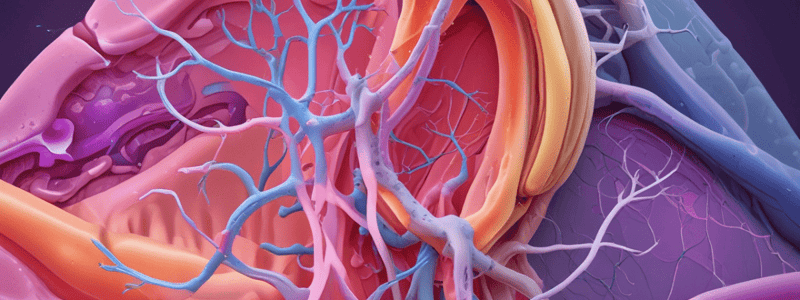Podcast
Questions and Answers
Which of the following is NOT a common risk factor for acute kidney injury (AKI)?
Which of the following is NOT a common risk factor for acute kidney injury (AKI)?
- Intravascular volume depletion
- Aminoglycoside use
- Radiocontrast dye exposure
- Use of proton-pump inhibitors (correct)
Which of the following medications may contribute to intraoperative hypotension and exacerbate AKI in the setting of impaired hemodynamics?
Which of the following medications may contribute to intraoperative hypotension and exacerbate AKI in the setting of impaired hemodynamics?
- Angiotensin-converting enzyme (ACE) inhibitors
- Both ACE inhibitors and ARBs (correct)
- Neither ACE inhibitors nor ARBs
- Angiotensin II receptor blockers (ARBs)
Which of the following methods is recommended for identifying patients with preexisting renal insufficiency during the perioperative evaluation?
Which of the following methods is recommended for identifying patients with preexisting renal insufficiency during the perioperative evaluation?
- Measurement of serum creatinine and urinalysis (correct)
- Measurement of urine output
- Measurement of glomerular filtration rate (GFR)
- Measurement of blood urea nitrogen (BUN)
Approximately what percentage of the United States population is affected by chronic kidney disease?
Approximately what percentage of the United States population is affected by chronic kidney disease?
Which of the following is NOT mentioned as a common risk factor for chronic kidney disease?
Which of the following is NOT mentioned as a common risk factor for chronic kidney disease?
Which of the following genetic polymorphisms demonstrate strong associations with AKI after cardiac surgery?
Which of the following genetic polymorphisms demonstrate strong associations with AKI after cardiac surgery?
Among the following, which patient characteristic is NOT listed as a significant risk factor for AKI after cardiac surgery?
Among the following, which patient characteristic is NOT listed as a significant risk factor for AKI after cardiac surgery?
What did the KDIGO guidelines recommend regarding selecting off-pump CABG surgery?
What did the KDIGO guidelines recommend regarding selecting off-pump CABG surgery?
What interaction did the CORONARY clinical trial show regarding preoperative chronic kidney disease and type of CABG surgery?
What interaction did the CORONARY clinical trial show regarding preoperative chronic kidney disease and type of CABG surgery?
What is the primary mechanism by which anesthesia and surgery influence normal renal function?
What is the primary mechanism by which anesthesia and surgery influence normal renal function?
What is the relationship between markers of abnormal central aortic compliance and postoperative AKI and dialysis?
What is the relationship between markers of abnormal central aortic compliance and postoperative AKI and dialysis?
How does pulse pressure relate to the effects of large artery stiffness and the rate of pressure propagation and reflection within the arterial tree?
How does pulse pressure relate to the effects of large artery stiffness and the rate of pressure propagation and reflection within the arterial tree?
How do patients with a predisposition to low flow attributable to abnormal central aortic compliance differ from normotensive patients in terms of perioperative renal risk?
How do patients with a predisposition to low flow attributable to abnormal central aortic compliance differ from normotensive patients in terms of perioperative renal risk?
How do epidural and spinal anesthesia affect the sympathetic innervation of the renal vasculature?
How do epidural and spinal anesthesia affect the sympathetic innervation of the renal vasculature?
What is the potential impact of intraoperative neuraxial blockade and postoperative epidural analgesia on the rate of postoperative acute kidney injury?
What is the potential impact of intraoperative neuraxial blockade and postoperative epidural analgesia on the rate of postoperative acute kidney injury?
What is the association between thoracic epidural anesthesia and improved surgical outcomes?
What is the association between thoracic epidural anesthesia and improved surgical outcomes?
Which of the following inhaled anesthetics was associated with polyuric renal insufficiency when used for prolonged periods?
Which of the following inhaled anesthetics was associated with polyuric renal insufficiency when used for prolonged periods?
Which of the following is a potential mechanism by which propofol may have renoprotective effects?
Which of the following is a potential mechanism by which propofol may have renoprotective effects?
According to the passage, which of the following statements is true regarding renal blood flow (RBF) during cardiopulmonary bypass (CPB) surgery?
According to the passage, which of the following statements is true regarding renal blood flow (RBF) during cardiopulmonary bypass (CPB) surgery?
According to the passage, approximately what percentage of patients who undergo coronary artery bypass graft (CABG) surgery in the United States develop acute kidney injury (AKI) as defined by the need for acute dialysis or a doubling of serum creatinine from baseline?
According to the passage, approximately what percentage of patients who undergo coronary artery bypass graft (CABG) surgery in the United States develop acute kidney injury (AKI) as defined by the need for acute dialysis or a doubling of serum creatinine from baseline?
According to the passage, which of the following statements is true regarding the mechanism of perioperative acute kidney injury (AKI) during cardiac surgery?
According to the passage, which of the following statements is true regarding the mechanism of perioperative acute kidney injury (AKI) during cardiac surgery?
According to the passage, which of the following statements is true regarding the use of dexmedetomidine during cardiac surgery?
According to the passage, which of the following statements is true regarding the use of dexmedetomidine during cardiac surgery?
According to the passage, which of the following statements is true regarding the effects of sevoflurane, an inhaled anesthetic?
According to the passage, which of the following statements is true regarding the effects of sevoflurane, an inhaled anesthetic?
Flashcards are hidden until you start studying




